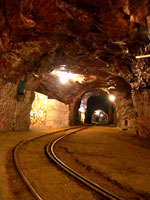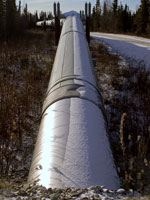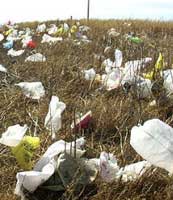
News |
- NWT Protected Area Opened To Mining
- Obama Urged to Squash Canadian Pipeline
- Most G20 Charges Dropped, Lawsuits and Investigations Continue
- NTREE: Canada Needs Cap and Trade Now
- Hydro PUB Hearings Underway
- Hearing Announced for LWR, No Word on CRD
- Tipping Point: The Age of the Oil Sands
- In 2011 End Tax Breaks to Dirty Fuels!
- Beach Meeting Packed
- St. Joseph Wind Project Finally Operational
- Call for Halt on Lake & Wetland Development
- Italy Bans Plastic Bags, While Toronto May Scrap Plastic Bag Fee
| NWT Protected Area Opened To Mining | 12 February 11 |
 In 2002, the Canadian Wildlife Service (CWS) of Environment Canada agreed to be the sponsoring agency, and to work toward creating the Edéhzhíe National Wildlife Area (NWA) through Canada Wildlife Act. Interim protection expired at the end of October 2010. Protection was renewed in November 2010, but without the critical subsurface protection provisions that prevent mining claims from encroaching on the area.
In 2002, the Canadian Wildlife Service (CWS) of Environment Canada agreed to be the sponsoring agency, and to work toward creating the Edéhzhíe National Wildlife Area (NWA) through Canada Wildlife Act. Interim protection expired at the end of October 2010. Protection was renewed in November 2010, but without the critical subsurface protection provisions that prevent mining claims from encroaching on the area.Edéhzhíe, also known as the Horn Plateau, is located West of Great Slave Lake and comprises 14,250-square-kilometre of undulating plateau rising over 400 m over the surrounding boreal plains and lowlands. Edéhzhíe features prominently in Dené legends, is home to caribou and moose, and is also the source for water in three major drainage basins. "In our view, the federal government's unilateral decision to open Edehzie to mining interests represents a very large betrayal of trust," said Dehcho Grand Chief Samuel Gargan. On December 2, 2010 the Dehcho First Nations filed an Application for Judicial Review in Federal Court. "We cannot stand by and allow sacred ancestral lands and the watershed to be destroyed. We will protect our land," said Gargan. "We support the Dehcho First Nations in their resolve to have Canada reinstate the full protection for Edéhzhíe that has been in place since 2002," said Larry Innes Canadian Boreal Initiative Executive Director. "Opening the area to mineral claims puts pristine boreal ecosystems at risk, and undermines the confidence of NWT communities, industry, and conservationists alike in the NWT Protected Area Strategy process." View December 15, 2010 Globe and Mail articleView December 15, 2010 Canadian Boreal Initiative press release View December 2, 2010 Indigenous People Issues & Resources article View November 3, 2010 WWF press release View November 15, 2010 Boreal Songbird Initiative blog View October 28, 2010 Canada Gazette Order in Council Sources: Globe and Mail, Canadian Boreal Initiative |
|
 Print version Print version |
Top |
| Obama Urged to Squash Canadian Pipeline | 12 February 11 |
 86 environmental organizations sent a letter to President Obama in advance of his meeting with Canadian Prime Minister Stephen Harper in Washington February 4, 2011. The groups are urging the Obama administration not approve TransCanada Keystone XL pipeline, which would transport oil from Alberta's tar sands to refineries in Texas.
86 environmental organizations sent a letter to President Obama in advance of his meeting with Canadian Prime Minister Stephen Harper in Washington February 4, 2011. The groups are urging the Obama administration not approve TransCanada Keystone XL pipeline, which would transport oil from Alberta's tar sands to refineries in Texas.The pipeline is currently in limbo as the State Department weighs whether to grant a presidential permit allowing construction to begin. The pipeline has been on indefinite hold since July 2010, when the U.S. Environmental Protection Agency described a draft environmental study of the project as "inadequate" - raising concerns about greenhouse gas emissions and the potential threat to sensitive ecosystems of a spill. The State Department is now weighing whether to conduct a supplemental eco-study providing more detail on Keystone's emergency response plans, the chemical composition of the tar sands bitumen and potential damage to groundwater from pipeline leaks or spills. "The choice that the United States faces... is whether to increase its capacity to accept such energy from the most secure, most stable and friendliest location it can possibly get that energy, which is Canada, or from other places that are not as secure, stable or friendly to the interests and values of the United States," said Harper, adding that the U.S. will need far more oil based energy than it can produce. "What Prime Minister Harper failed to acknowledge is that tar sands oil is highly polluting. There are cleaner, safer ways to meet U.S. energy needs than to import this dirty oil from Canada via a dangerous pipeline through America's heartland," said Alex Moore, dirty fuels campaigner at Friends of the Earth U.S. Warnings that the pipeline could increase emissions and threaten water supplies have riled up people across the political spectrum in the U.S. including those not normally supportive of environmentalists such as ranchers in Nebraska and former oil refinery workers in Texas. View February 4, 2011 open letter to President Obama (PDF)View February 4, 2011 Mother Jones article View February 4, 2011 Montreal Gazette article View February 4, 2011 Natural Resources Defense Council blog View February 4, 2011 Friends of the Earth response to Harper Watch February 4, 2011 President Obama and Prime Minister Harper Press Conference View February 2, 2011 National Wildlife Federation blog View January 24, 2011 Los Angeles Times article View January/February 2011 Mother Jones article View November 3, 2010 and September 7, 2010 Manitoba Wildlands news items Sources: Mother Jones, Montreal Gazette |
|
 Print version Print version |
Top |
| Most G20 Charges Dropped, Lawsuits and Investigations Continue | 5 February 11 |
 G20 demonstration organizer Alex Hundert, 30, was arrested at home the day before June 2010 Toronto G20 demonstrations began. He was charged with three counts of conspiracy related to organizing demonstrations. Released on $100,000 bail in July under strict conditions, including house arrest, and Hundert was prohibited from participating in any public demonstrations. Hundert was arrested for breaching his bail conditions when he appeared in a Ryerson University seminar about the G20 summit. Hundert plead guilty for breaching his bail January 24, 2011. This means the question of whether a university panel constitutes a public demonstration will not be adequately answered by the courts.
G20 demonstration organizer Alex Hundert, 30, was arrested at home the day before June 2010 Toronto G20 demonstrations began. He was charged with three counts of conspiracy related to organizing demonstrations. Released on $100,000 bail in July under strict conditions, including house arrest, and Hundert was prohibited from participating in any public demonstrations. Hundert was arrested for breaching his bail conditions when he appeared in a Ryerson University seminar about the G20 summit. Hundert plead guilty for breaching his bail January 24, 2011. This means the question of whether a university panel constitutes a public demonstration will not be adequately answered by the courts."I made this plea because I realized I was doing no good to anyone as I sat in jail... I took a deal that would allow me to get back into my community where I can continue to commit myself to issues of social and environmental justice," said Hundert. "What we are challenging here is the way in which policing and correctional resources were used when there was no threat to public safety," said Nathalie Des Rosiers, a lawyer for the Canadian Civli Liberties Association. "That's a concern all Canadians should have." Of the more than 1000 G20 protest arrests, only 99 criminal charges remain outstanding. The rest have been withdrawn by the Crown. Several investigations and class action lawsuits into police actions and arrests during the G20 summit are ongoing. At least one Toronto Police officer, Const. Andalib-Goortani, has been charged with two counts of assault following investigations by Ontario's Special Investigation Unit. View February 2, 2011 Toronto Star articleView February 2, 2011 Globe and Mail article View January 31, 2011 Canadian Civil Liberties Association press release View January 19, 2011 Alex Hundert statement View Manitoba Wildlands International Meetings: G20 web page Sources: Canadian Civil Liberties Association, Toronto Star, The Globe and Mail |
|
 Print version Print version |
Top |
| NTREE: Canada Needs Cap and Trade Now | 1 February 11 |
 It makes economic and environmental sense for Canada to set its own climate policies now rather than waiting for the U.S. to introduce its system to control greenhouse gas emissions, says a new report, Parallel Paths: Canada-U.S. Climate Choices, by Canada's National Round Table on the Environment and the Economy (NRTEE).
It makes economic and environmental sense for Canada to set its own climate policies now rather than waiting for the U.S. to introduce its system to control greenhouse gas emissions, says a new report, Parallel Paths: Canada-U.S. Climate Choices, by Canada's National Round Table on the Environment and the Economy (NRTEE)."Canada clearly needs stronger climate policies, fast – and today's analysis shows that cutting greenhouse gas pollution in Canada is both affordable and feasible. The Round Table's detailed and credible analysis shows that Canada would see strong economic growth across the country even if we lead the United States in adopting a broad-based price on greenhouse gas pollution," said Clare Demerse, Associate Director of the Pembina Institute's climate change program. "Harmonization, where possible and when feasible, make sense for Canada. But in the face of persistent U.S. uncertainty as to its own climate policy future, Canada will need to look to its own options, in the right way, at the right time." said David McLaughlin, NRTEE President and CEO. The NTREE Report warns, "[d]elay leads to rising carbon emissions each year, and a higher financial and economic cost in ultimately acting to meet our stated GHG emission targets for 2020 or beyond. Neither outcome is desirable or inevitable." View January 25, 2011 NTREE report, Parallel Paths: Canada-U.S. Climate Choices (PDF)View January 25, 2011 Pembina Institute response to NTREE report View January 25, 2011 Vancouver Sun article View January 25, 2011 CBC News article View January 25, 2011 Globe and Mail article View January 25, 2011 Toronto Star article View Manitoba Wildlands Canada Initiatives page Sources: NTREE, Pembina Institute, Vancouver Sun, CBC News |
|
 Print version Print version |
Top |
| Hydro PUB Hearings Underway | 25 January 11 |
 Manitoba Public Utilities Board (PUB), the administrative tribunal that regulates public utilities, commenced Manitoba Hydro General Rate Application hearings for a two-year period (2010-12) on January 5, 2011. The goal of the hearings is to determine what Hydro should be charging its Manitoba customers for electricity. The hearings are anticipated to last until March 23, 2011.
Manitoba Public Utilities Board (PUB), the administrative tribunal that regulates public utilities, commenced Manitoba Hydro General Rate Application hearings for a two-year period (2010-12) on January 5, 2011. The goal of the hearings is to determine what Hydro should be charging its Manitoba customers for electricity. The hearings are anticipated to last until March 23, 2011.The PUB hearings will also examine Hydro's overall risk management and financial position, including a probe into allegations made by a New York-based consultant who warned of outdated resource analytics, blackouts and financial bungling. February 2010 the PUB ordered an interim rate hike of 2.9% to take effect April 1, 2010. Hydro has also applied for a 2.9% rate increase to take effect April 1, 2011. The PUB has said that if the interim increase is eventually deemed to have been unjustified, it might order Hydro to issue a refund to customers. View January 6, 2011 Winnipeg Free Press articleView January 5, 2011 Winnipeg Free Press article View January 3, 2011 Winnipeg Sun article View Manitoba Public Utilities Board, Manitoba Hydro - 2010-11 Filings View Manitoba Public Utilities Board, Order No. 18/10 (PDF) View April 1, 2010 Great Canadian Talk Show Hydro whistleblower interview Sources: Winnipeg Free Press, Winnipeg Sun |
|
 Print version Print version |
Top |
| Hearing Announced for LWR, No Word on CRD | 25 January 11 |
 Manitoba Hydro applied to Manitoba Water Stewardship December 22, 2010 to replace the four decades old interim Lake Winnipeg Regulation (LWR) water power licence with a permanent licence issued under Manitoba's Water Power Act.
Manitoba Hydro applied to Manitoba Water Stewardship December 22, 2010 to replace the four decades old interim Lake Winnipeg Regulation (LWR) water power licence with a permanent licence issued under Manitoba's Water Power Act.Since 1970 Manitoba Hydro has been regulating Lake Winnipeg water levels under an interim licence. The interim licence authorizes holding back Lake Winnipeg in spring and summer, and releasing water into the Nelson River in winter when energy demand is high. Essentially Lake Winnipeg—the 11th largest freshwater lake in the world—is manipulated to function as a 'battery' or resovoir for Manitoba Hydro. Manitoba Premier Greg Selinger announced January 4, 2011 that public hearings would be a part of determining whether or not, and under what terms, a final LWR licence would be granted. The hearings, likely to be in fall 2011, will be the first time in almost 40 years that Manitoba Hydro will publicly answer allegations that its control of the lake leads to shoreline destruction, or growth of toxic blue-green algae. "I think that will provide an opportunity for anybody with concerns to be able to put their comments in, and their research, and indicate their concerns with Lake Winnipeg regulation," Selinger said. It is unclear if the Churchill River Diversion (CRD), which operates under a 1977 interim licence, will also be part of the Lake Winnipeg regulation public review and hearings. The Interim CRD Licences allow Manitoba Hydro to divert waters of the Churchill River into the Burntwood/Nelson River system and changes the flow and water levels of the affected areas and lakes. Kelsey Generating Station located on the Nelson River south of Split Lake operates with a short term amended licence while upgrades are made to the station. Limestone Generating Station located on the Nelson River North East of Split Lake operates on an interim licence first issued in 1976. Manitoba Hydro applied for permanent CRD licences May 6, 2009, but the application is still pending. View January 4, 2011 Winnipeg Free Press articleView December 22, 2010 Manitoba Hydro Letter to Manitoba Water Stewardship (PDF) View June 2, 2009 Manitoba Water Stewardship Letter to Manitoba Hydro (PDF) View May 6, 2009 Manitoba Hydro Letter to Manitoba Water Stewardship (PDF) View Manitoba Government: Water Stewardship, Churchill River Diversion website View Manitoba Government: Water Stewardship, Water Power Licensing View Manitoba Wildlands/Energy Manitoba 2005 Report on the Lake Winnipeg Regulation and Churchill River Diversion (PDF) Sources: Manitoba Water Stewardship, Winnipeg Free Press |
|
 Print version Print version |
Top |
| Tipping Point: The Age of the Oil Sands | 25 January 11 |
 Tipping Point, a special two-hour presentation of CBC-TV's The Nature of Things on air January 27 and February 5, 2011, takes viewers inside the David and Goliath struggle over Alberta oil sand development.
Tipping Point, a special two-hour presentation of CBC-TV's The Nature of Things on air January 27 and February 5, 2011, takes viewers inside the David and Goliath struggle over Alberta oil sand development.For years, residents of the northern Alberta community of Fort Chipewyan have been plagued by rare forms of cancer. They are concerned toxins from nearby oil sands production might be to blame. Industry and government, meanwhile, claim production in the oil sands contributed zero pollution to the Athabasca River. In 2010, new independent research measured pollution in waters flowing through the Alberta oil sands and discovered higher-than-expected levels of toxins, including arsenic, lead and mercury, coming from industrial plants. Dr. David Schindler, renowned freshwater scientist, lead the research. By the end of 2010 reports from Canada's Auditor General, the Royal Society of Canada, and a panel of experts appointed by then Environment Minister Jim Prentice revealed a decade of lax and inadequate pollution monitoring, paid for by industry, in Alberta's oil sands. The Tipping Point documentary climax shows how Professor Schindler's research findings, and the determination of Fort Chipewyan residents, are leading to change. In December 2010, the special scientific review by a high-level federal panel declared environmental monitoring standards in the oil sands seriously flawed. In a dramatic reversal of their previous position, both the Canadian and Albertan governments announced steps to improve pollution monitoring. View CBC Nature of Things: Tipping Point websiteView July 2, 2010 Proceedings of National Academy of Sciences: Dr. David W. Schindler View March 30, 2010 Canadian Parliamentary Standing Committee on Environment and Sustainable Development: Testimony of David Schindler View February 2009, Alberta Cancer Board report View Pembina Institute's OilSandsWatch.org Sources: CBC |
|
 Print version Print version |
Top |
| In 2011 End Tax Breaks to Dirty Fuels! | 25 January 11 |
 Climate Action Network Canada is asking Canadians to kick start 2011 by calling, e-mailing, or meeting with their MP to find out one simple thing: do they support ending the giveaway of over a billion dollars a year to oil companies?
Climate Action Network Canada is asking Canadians to kick start 2011 by calling, e-mailing, or meeting with their MP to find out one simple thing: do they support ending the giveaway of over a billion dollars a year to oil companies?The idea is to put pressure on Canada's Government, and to find out where every Member of Parliament in Canada stands on ending subsidies to fossil-fuel industries. Be sure to let Climate Action Network Canada know the results by e-mailing them at cjohn@climateactionnetwork.ca or by joining them on Facebook. Canadian Parliament is set to resume on Jan. 31, with a budget expected in February or March. If lawmakers in Ottawa are looking for ways to reduce deficits and spending, it seems that subsidies to the oil, coal and gas industries are the best place to start. Analysis shows a total of $1.4 billion per year in Canadian federal tax breaks to the fossil fuel industry, with most going to dirty fuels such as the Alberta tar sands companies. "Scientists are warning that we face disastrous consequences unless we reduce greenhouse gas emissions that come from burning fossil fuels. By subsidizing the fossil fuel industry, the Canadian government is delaying the conversion to clean energy that's needed to stabilize the Earth's climate. Canadian taxpayers should not be giving money to highly profitable corporations," states Climate Action Network on their webpage. 67 national organizations have endorsed the call to end tax breaks to dirty fuels. View 2010 Climate Action Network news releaseJoin Climate Action Network's Facebook page View November 10, 2010 Climate Action Network's Open Letter to Prime Minister Harper and Minister Flaherty View November 4, 2010 Climate Action Network Report: Fueling the Problem (PDF) View November 9, 2010, November 30, 2010 Manitoba Wildlands news items View Climate Action Network Canada Fact Sheet Sources: Climate Action Network |
|
 Print version Print version |
Top |
| Beach Meeting Packed | 18 January 11 |
 The Victoria Beach Municipal Meeting at Winnipeg Fort Gary United Church was packed with approximately 350 people January 12, 2011. The meeting was held regarding the proposed construction of a shoreline revetment along King Edward and Alexander Beaches on the East Side of Lake Winnipeg.
The Victoria Beach Municipal Meeting at Winnipeg Fort Gary United Church was packed with approximately 350 people January 12, 2011. The meeting was held regarding the proposed construction of a shoreline revetment along King Edward and Alexander Beaches on the East Side of Lake Winnipeg.Shoreline revetment barriers generally tend to narrow beach in front. Residents and cottage owners are worried the stone revetment, intended to protect the property of some cottage owners, will negatively impact access to the public beach. "The massive turn out tonight is indicative of everybody's concern. I think we all want to do the right thing. It is premature," said Aynslie MacPherson. The 11-meter (36 ft) wide revetment will be built on land owned by the local municipality and paid for by the cottage owners along the beachfront. Presently 11 out of 17 property owners are in support of the proposal. The Municipal Council approved the proposal in principle December 20, 2010. It still requires approval from the Provincial Shoreline Erosion Technical Advisory Committee. A presentation by two beachfront cottage owners, Mark Tooley and Gregg Hanson, who have been the main proponents, consumed the most of the meeting. "It seemed to me that they had their mind made up as to what the solution was, and they wanted to get it in place by springtime; and that's a railroad job. Where is the Environmental Impact Study? There isn't one," said Blair Bingeman. "We are concerned about the cottage owners, but were also concerned about the natural habitat. There is concern about the Piping Plover. We have questions about what will happen to any of the natural environment and the riparian zone. I think we should do more public consultations. We need to look at all the different options, not just two people looking at the option most pleasing to them," said Trish Richardson Mason. Many citizens voiced complaints about inadequate consultations, and the Reeve Tom Farrell was forced to promise further consultation given public interest, lack of access to information, and limited meeting time for questions. "Good on them for saying they were going to do another meeting. They need to do as many meetings as they need, so that people can feel comfortable and enthusiastic about whatever the solution ends up being," said Val Bingeman. As of January 17, 2011 no announcements have been made regarding next meeting, and the materials presented have not been posted on Victoria Beach municipal website. View January 13, 2011 Winnipeg Free Press articleView January 13, 2011 CBC News article View January 13, 2011 CTV News article View January 4, 2011 Manitoba Wildlands news item View January 12, 2010 Public Meeting Handout (PDF) View Manitoba Wildlands Land Use Planning page Sources: Manitoba Wildlands, Winnipeg Free Press, Victoria Beach Municipality |
|
 Print version Print version |
Top |
| St. Joseph Wind Project Finally Operational | 18 January 11 |
 Turbines at St. Joseph Wind Energy project began producing electricity January 11, 2011. When fully operational the project will produce enough electricity for 50,000 homes.
Turbines at St. Joseph Wind Energy project began producing electricity January 11, 2011. When fully operational the project will produce enough electricity for 50,000 homes.The project, initially slated to have a electrical generation capacity of 300 megawatts (MW) was scaled down to 138MW and largely financed by Manitoba Hydro after private financial backers pulled out. Three separate Government of Manitoba Orders in Council (#88-90) issued March 18, 2010 authorized the financing and operation of the St. Joseph wind energy project located near Letellier, Manitoba. Under the arrangement the $345 million dollar project was funded with $95 million from Pattern Energy and a $250-260 million Manitoba Hydro loan to the St. Jospeh Wind Farm Inc. Repayments to the loan are to be deducted against what Manitoba Hydro owes for power purchased, and in the case of default hydro takes ownership of the wind towers. Six years ago, the province set a target of producing 1,000 megawatts of power from wind within a decade, but it's likely to fall short of that. View January 11, 2011 Manitoba Government news releaseView January 11, 2011 CTV News article View January 12, 2011 Winnipeg Free Press article View January 15, 2011 Winnipeg Free Press article View Manitoba Hydro 59th Annual Report (pg. 28 online – 26 print) View March 29, 2010 Manitoba Wildlands news item View Manitoba Wildlands Energy Development web page Sources: Manitoba Government, Manitoba Hydro, Winnipeg Free Press |
|
 Print version Print version |
Top |
| Call for Halt on Lake & Wetland Development | 17 January 11 |
 The Lake Winnipeg Foundation, Ducks Unlimited Canada, and the Lake Winnipeg Watershed Initiative are asking the Manitoba government to put a temporary halt on developments that could affect shorelines and the province's lakes until the government has a policy for such decisions founded on scientific principles.
The Lake Winnipeg Foundation, Ducks Unlimited Canada, and the Lake Winnipeg Watershed Initiative are asking the Manitoba government to put a temporary halt on developments that could affect shorelines and the province's lakes until the government has a policy for such decisions founded on scientific principles.The groups said they recently became concerned about shorelines and watersheds after a private individual dug a boat channel at Beaconia Marsh on Lake Winnipeg, before the province stepped in to stop it. The groups say what happens onshore contributes to ongoing excess nutrients in Lake Winnipeg and the resulting blue-green algae blooms. "All too often development is done in the name of progress, but the marsh is doing a good job and now you've taken it away. When the marshlands are healthy, they do a good job of holding back stuff from the lake. There's a price to be paid and we're paying it," said Gordon Goldsborough, a professor at the University of Manitoba. "These are the last defence before the runoff goes into the water. If we can't even put protection right at the very edge of the lake, how can we expect people hundreds of kilometres away in the watershed to help?" said Lake Winnipeg Watershed Initiative Coordinator Vicki Burns. Burns also said while they are asking for a temporary moratorium, the long-term solution may be not to allow development close to shores. It might be time for the provincial government to manage public lands around the lakes, instead of local municipalities. A provincial spokeswoman said Manitoba Water Stewardship is currently reviewing proposed policy for the protection of shoreline, erosion-prone areas and other environmentally sensitive areas near water. The Manitoba Water Council conducted a pubic request for comments regarding Manitoba wetlands during 2010. To date no report has been released. View November 22, 2010 Letter to the Province of ManitobaView January 14, 2011 Winnipeg Free Press article View Lake Winnipeg Foundation website View Manitoba Water Council website Sources: Winnipeg Free Press, Lake Winnipeg Foundation |
|
 Print version Print version |
Top |
| Italy Bans Plastic Bags, While Toronto May Scrap Plastic Bag Fee | 15 January 11 |
 Effective January 1, 2011 Italy became the first European nation to ban nonbiodegradable plastic bags. Italians use about 20 billion bags a year -- more than 330 per person -- or about one-fifth of the total used in Europe Shops will be allowed to hand out any plastic bags they have in stock, but once those run out they cannot order more. It is unclear what the penalties are or how they will be applied.
Effective January 1, 2011 Italy became the first European nation to ban nonbiodegradable plastic bags. Italians use about 20 billion bags a year -- more than 330 per person -- or about one-fifth of the total used in Europe Shops will be allowed to hand out any plastic bags they have in stock, but once those run out they cannot order more. It is unclear what the penalties are or how they will be applied.Italy joins a number of other countries and cities worldwide who have imposed fees or outright bans of plastic bags. In March of 2002, Republic of Ireland became the first country to introduce a plastic bag fee and usage of dropped 94 per cent within weeks. China outlawed retailers from handing out plastic bags in June 2008. In March 2007 San Francisco became the first North American city to ban plastic bags, followed by the Manitoba community of Leaf Rapids in April of 2007. Toronto was the first North American city to make shoppers pay for disposable plastic bags in June of 2009. Plastic bag use 70%. But Toronto's new mayor, Rob Ford, is looking to scrap the successful Toronto bag fee. He claims people "can't stand" the bag fee. "People have already voted [on the fee]," says Toronto councillor Glenn De Baeremaeker. "They voted with their reusable bags. They voted when within two weeks of this fee being passed, plastic bag usage dropped by 70%." "I guess the moral of the story is it doesn't take a lot [to change consumer habits]," said Rod Muir of the Sierra Club. View December 30, 2011 Planet Ark articleView December 31, 2011 Telegraph article View January 3, 2011 CBC News article View January 3, 2011 KOHD News article View January 6, 2011 Toronto Star article View Leaf Rapid, Manitoba website Sources: Planet Ark, CBC News |
|
 Print version Print version |
Top |


 RSS Feeds:
RSS Feeds: